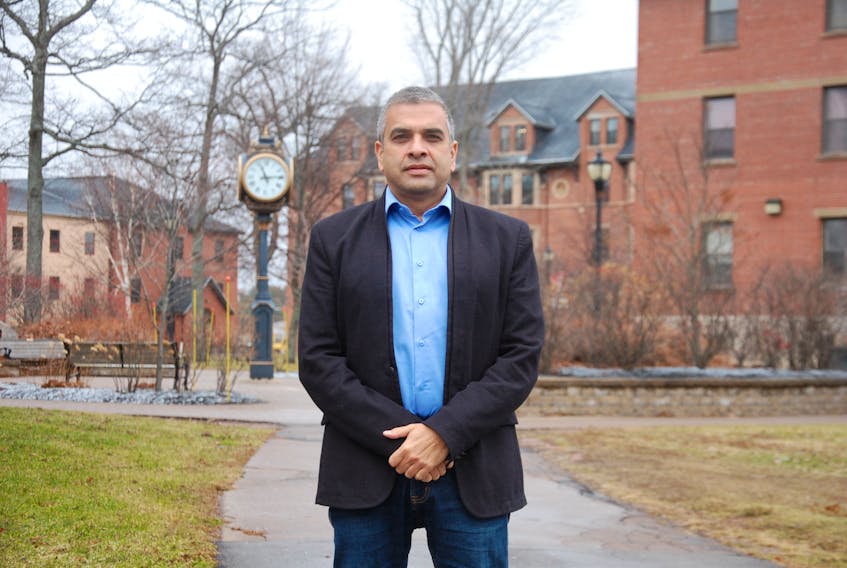CHARLOTTETOWN, P.E.I. — A steady rise in abusive behaviour by patients towards emergency department staff at the Queen Elizabeth Hospital in Charlottetown, including verbal and physical attacks by unruly people under arrest, has created a crisis situation, says a long-time emergency room physician.
Triage nurses, says Dr. Trevor Jain, are abused verbally every single day. He witnessed one nurse being punched in the face by a person under arrest who was brought in for medical attention.
Last year, Jain was held against a wall and choked by a person also under arrest. Jain had some soft tissue damage but says he could have been seriously injured.
The steady barrage of abuse, he warns, is beating down the resolve of staff.
The emergency department is down four physicians. Nurses are leaving because of high stress and regular abuse.
“It makes people not want to work there,’’ says Jain.
“The system is stressed, and the emergency department is the canary in the coal mine for the (health) system.’’
“What I can tell you is that almost all emergency department physicians at the QEH are thinking about an exit strategy, and what that means is to pivot and do something else in medicine. We have the earliest burnout rate of any specialty in medicine.’’
-Dr. Trevor Jain
Abuse, both verbal and physical, is not only delivered by persons under arrest. However, those picked up for allegedly committing a crime and carted off to the hospital for medical attention can often be a volatile group.
And such persons are flowing into the QEH emergency department at what Jain believes is an unnecessarily high rate.
Every day, at least one person under arrest is brought into the emergency department at the Queen Elizabeth Hospital, says Jain. He has seen as many as four come in during a shift.
He estimates a whopping 90 per cent of people under arrest brought into the hospital end up being medically cleared and discharged.
“That tells you that there was no medical issue (either physical or mental),’’ he says.
In other words, they didn’t need to be brought in to the emergency department in the first place.
However, Jain does not believe blame should be placed on the police officers.
“The police are held to an unrealistic, high expectation that if anything goes wrong in their custody, it’s automatically a police officer’s fault,’’ says Jain.
“So, they’re between a rock and a hard place. If they have somebody who may have any whiff of a medical issue or request medical attention…they will be taken to the QEH emergency department for medical clearance. We need to support our police forces and let them make reasonable decisions.’’

“We rarely prohibit access to a doctor…we always make sure the person’s health comes first. When someone requests to be seen by a paramedic or a doctor…we usually end up calling EMS or taking the person to the hospital.’’
-RCMP Sgt. Craig Eveleigh
Queens District RCMP Sgt. Craig Eveleigh says if persons under arrest pose danger to themselves or others, they will be brought into the hospital to be assessed. The same stands if a person is deemed to need medical attention for a physical health issue.
“We rarely prohibit access to a doctor…we always make sure the person’s health comes first,’’ says Eveleigh.
“When someone requests to be seen by a paramedic or a doctor…we usually end up calling EMS or taking the person to the hospital.’’
Charlottetown Police Services' Deputy Chief Brad McConnell says officers err on the side of caution when dealing with a person under arrest who may or may not need medical attention.
“We always put the welfare of the person that we are dealing with first,’’ says McConnell.
“If the officer has any concerns that the person may need health-care services…then they are going to take that individual to the hospital to be assessed.’’

However, transporting persons following an arrest to the hospital and waiting for the individuals to be assessed and medically cleared or treated is time consuming.
“It is a very taxing thing for our police services…it is a part of our services that is a challenge to deliver,’’ he says.
“I don’t know if I can put my finger on a definitive solution to this problem, but it will have to be a collaborative effort.’’
McConnell adds that officers experience the same kind of verbal abuse as hospital workers but notes officers are well-trained to deal with those situations.
Jain says there is an unrealistic expectation put on emergency department staff to provide a high level of care while being subjected to verbal and physical abuse.
“And no other profession does that. Teachers, lawyers, government workers do not have to perform in an environment where they are assaulted on almost a daily basis in some form or another,’’ he says.
Jain says the situation needs to change.
He says the most difficult place for a nurse to work is in the emergency department.
The same is true for doctors like Jain, who has been practising emergency medicine for 20 years, including the past dozen at the QEH.
“What I can tell you is that almost all emergency department physicians at the QEH are thinking about an exit strategy, and what that means is to pivot and do something else in medicine,’’ he says.
“We have the earliest burnout rate of any specialty in medicine.’’
Health P.E.I. acknowledges violence in health-care workplaces is a concern in the province.
“Emergency departments are high-stress environments for patients and staff, but it is not acceptable that staff are physically or verbally abused,’’ says Health P.E.I. in a statement to The Guardian.
“Our employees and patients should feel safe in the emergency department.’’

REACTION:
- DR. CHRIS MILBURN: It's not fair for critics to question my compassion or professionalism
- DR. JULIE CURWIN: Why Dr. Milburn's salvo against 'victimhood culture' went viral
- STEVE BARTLETT: ER doc’s commentary reaches hundreds of thousands
- DR. ARUNA DHARA & DR. LEAH GENGE: Patients need care, not condemnation
- CHRISTINE COOPER: Memo to Dr. Milburn — people in crisis no less worthy
- LETTERS: 'Criminal element' in ER — readers react to Sydney doctor
- MARYN MARSLAND & ALEX STRANG: Blaming patients unseemly — criminal behaviour often a byproduct of social ills
Want to wade into the debate? Write a letter to the editor and email it to [email protected]. Be sure to include a name, address and daytime telephone number where the author can be contacted. Letters should be no more than 250 words.
Health P.E.I. says it works with police agencies to get patients triaged and treated as quickly as is appropriate.
“However, these visits can take longer when the individuals are under the influence of alcohol and drugs,’’ says the provincial health authority.
“There are cases when these individuals become aggressive or violent. We do have security staff at our emergency departments and police are frequently called upon to assist in restraining and/or controlling a patient, if an individual becomes violent or aggressive.’’
Health P.E.I. encourages employees to report violent incidents and offers education to staff on how to respond to aggressive and violent patients.
“We continue to work with all of our employees to find solutions to this growing concern,’’ says Health P.E.I.
“Should a physician, nurse or support staff have any concern with their safety, they should discuss that with their manager/superviser.’’
Jain would like to see a public awareness campaign promoting zero tolerance towards patients verbally and physically abusing emergency department staff.
He adds a collaborative approach is needed to find a way to reduce the number of persons under arrest brought into the emergency department.
The provincial Justice and Safety Department, in a statement to The Guardian, says Islanders should have access to medical care where illness or injury is suspected. When an arrest is made and the law enforcement officer suspects a need for medical intervention, the individual can expect to receive fair and equal health care like anyone else.
"Programs and services available at correctional facilities are intended for offenders seeking rehabilitation treatment so that they will be able to transition back into their community at the end of their sentence,'' the statement adds.
Want to join the conversation? Comments are open on this article at SaltWire.com
RELATED:









